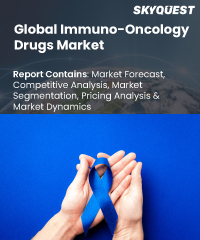
Report ID: SQMIG35I2108

Report ID:
SQMIG35I2108 |
Region:
Global |
Published Date: February, 2024
Pages:
157
|
Tables:
96 |
Figures:
76
Immuno-Oncology Drugs Market size was valued at USD 70.57 billion in 2022 and is poised to grow from USD 82.57 billion in 2023 to USD 289.93 billion by 2031, growing at a CAGR of 17% in the forecast period (2024-2031).
Immuno-Oncology Drugs are becoming popular since It allows for a personalized treatment approach based on patients, genetic makeup, tumor characteristics, and immune system. This approach can reduce side effects compared to traditional cancer treatments and improve outcomes.
The various advantages of Immuno-Oncology Drugs are Increased survival rates, Fewer side effects, Personalized treatment, the potential for long-term remission, and new treatment options. Immuno-oncology (IO) drugs have a distinct advantage over traditional cancer treatments, such as chemotherapy and radiation therapy, due to their ability to target cancer cells specifically. This targeted approach means that IO drugs do not harm healthy cells in the same way as traditional treatments, resulting in fewer side effects for patients. The reason for this targeted approach lies in the way IO drugs interact with the immune system. IO drugs stimulate the body's natural immune response, enabling the immune system to recognize and attack cancer cells. Unlike chemotherapy and radiation therapy, which can harm healthy cells in the process of killing cancer cells, IO drugs selectively target cancer cells, leaving surrounding healthy cells unharmed. This targeted approach not only reduces side effects but also improves patient outcomes. Patients receiving IO drugs have reported better quality of life and fewer complications associated with treatment. This is particularly important in cancer treatment, where side effects can be severe and can impact a patient's ability to tolerate treatment. Another important characteristic of IO drugs is their potential to produce long-lasting responses in patients with cancer, which can lead to long-term remission. Unlike traditional cancer treatments, which may produce temporary responses or require repeated cycles of treatment, IO drugs have demonstrated the ability to generate lasting effects. The mechanism behind this potential for long-term remission lies in the way IO drugs work. Rather than directly attacking cancer cells, IO drugs stimulate the body's immune system to identify and attack cancer cells. This immune response can continue even after treatment has ended, leading to ongoing cancer cell destruction and long-term remission. Research has shown that IO drugs can produce durable responses in patients with a variety of cancers, including melanoma, lung cancer, and bladder cancer. Some patients have remained in remission for years after treatment, demonstrating the potential for IO drugs to produce long-lasting benefits. The potential for long-term remission with IO drugs is particularly significant because cancer is often a chronic condition that requires ongoing treatment. By providing long-term remission, IO drugs offer a potential pathway to effectively managing cancer and improving patient outcomes.
US Immuno-Oncology Drugs Market is poised to grow at a sustainable CAGR for the next forecast year.
Our industry expert will work with you to provide you with customized data in a short amount of time.
REQUEST FREE CUSTOMIZATIONWant to customize this report? This report can be personalized according to your needs. Our analysts and industry experts will work directly with you to understand your requirements and provide you with customized data in a short amount of time. We offer $1000 worth of FREE customization at the time of purchase.

Report ID: SQMIG35I2108